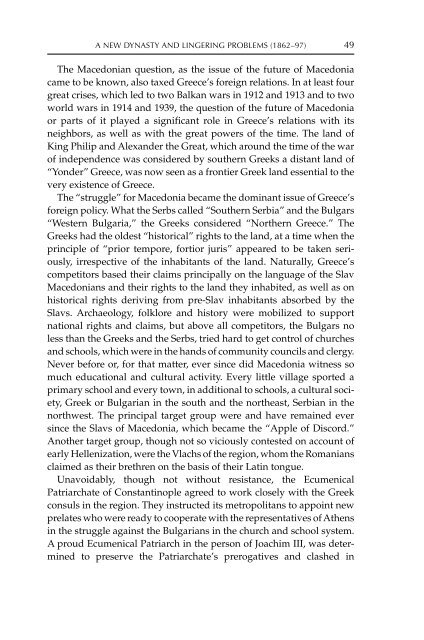MODERN GREECE: A History since 1821 - Amazon Web Services
MODERN GREECE: A History since 1821 - Amazon Web Services
MODERN GREECE: A History since 1821 - Amazon Web Services
Create successful ePaper yourself
Turn your PDF publications into a flip-book with our unique Google optimized e-Paper software.
A NEW DYNASTY AND LINGERING PROBLEMS (1862–97) 49<br />
The Macedonian question, as the issue of the future of Macedonia<br />
came to be known, also taxed Greece’s foreign relations. In at least four<br />
great crises, which led to two Balkan wars in 1912 and 1913 and to two<br />
world wars in 1914 and 1939, the question of the future of Macedonia<br />
or parts of it played a significant role in Greece’s relations with its<br />
neighbors, as well as with the great powers of the time. The land of<br />
King Philip and Alexander the Great, which around the time of the war<br />
of independence was considered by southern Greeks a distant land of<br />
“Yonder” Greece, was now seen as a frontier Greek land essential to the<br />
very existence of Greece.<br />
The “struggle” for Macedonia became the dominant issue of Greece’s<br />
foreign policy. What the Serbs called “Southern Serbia” and the Bulgars<br />
“Western Bulgaria,” the Greeks considered “Northern Greece.” The<br />
Greeks had the oldest “historical” rights to the land, at a time when the<br />
principle of “prior tempore, fortior juris” appeared to be taken seriously,<br />
irrespective of the inhabitants of the land. Naturally, Greece’s<br />
competitors based their claims principally on the language of the Slav<br />
Macedonians and their rights to the land they inhabited, as well as on<br />
historical rights deriving from pre-Slav inhabitants absorbed by the<br />
Slavs. Archaeology, folklore and history were mobilized to support<br />
national rights and claims, but above all competitors, the Bulgars no<br />
less than the Greeks and the Serbs, tried hard to get control of churches<br />
and schools, which were in the hands of community councils and clergy.<br />
Never before or, for that matter, ever <strong>since</strong> did Macedonia witness so<br />
much educational and cultural activity. Every little village sported a<br />
primary school and every town, in additional to schools, a cultural society,<br />
Greek or Bulgarian in the south and the northeast, Serbian in the<br />
northwest. The principal target group were and have remained ever<br />
<strong>since</strong> the Slavs of Macedonia, which became the “Apple of Discord.”<br />
Another target group, though not so viciously contested on account of<br />
early Hellenization, were the Vlachs of the region, whom the Romanians<br />
claimed as their brethren on the basis of their Latin tongue.<br />
Unavoidably, though not without resistance, the Ecumenical<br />
Patriarchate of Constantinople agreed to work closely with the Greek<br />
consuls in the region. They instructed its metropolitans to appoint new<br />
prelates who were ready to cooperate with the representatives of Athens<br />
in the struggle against the Bulgarians in the church and school system.<br />
A proud Ecumenical Patriarch in the person of Joachim III, was determined<br />
to preserve the Patriarchate’s prerogatives and clashed in


